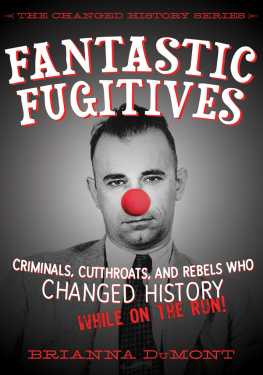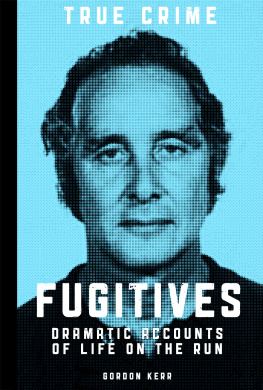Jerry Clark retired as a special agent with the Federal Bureau of Investigation in 2011 after twenty-seven years in law enforcement, including careers as a special agent with the Drug Enforcement Administration and the Naval Criminal Investigative Service. He received a PhD in public service leadership from Capella University, an MA in forensic psychology from the City University of New York John Jay College of Criminal Justice, and a BA in psychology from Edinboro University of Pennsylvania. Clark is an associate professor of criminal justice at Gannon University in Erie, Pennsylvania, where he owns Fisher Security.
Ed Palattella joined the Erie Times-News, in Erie, Pennsylvania, in 1990. He has won a number of awards, including those for his investigative work and coverage of crime. He arrived in Erie after reporting for the Point Reyes Light in Marin County, California. Palattella received an MA in journalism from Stanford University and a BA in English literature from Washington University in St. Louis.
Clark and Palattella are the coauthors of Pizza Bomber: The Untold Story of Americas Most Shocking Bank Robbery, A History of Heists: Bank Robbery in America, and Mania and Marjorie Diehl-Armstrong: Inside the Mind of a Female Serial Killer. Clark was the lead FBI special agent on the investigation of the Pizza Bomber case, which was FBI Major Case 203.
W riting about fugitives in America meant exploring a wide range of American history, including accounts of the Constitutional Convention to tales of how the movies and television have portrayed criminals and those on the run. As always, we are grateful for the support and expertise of librarians and other research specialists who showed great interest in our project and great patience with us. They include Russ Hall and Jane Ingold, reference and instructional librarians at the John M. Lilley Library at Penn State Behrend in Erie, Pennsylvania, where Matthew Ciszek is the head librarian. We also appreciate the assistance of the staff at the Nash Library at Gannon University, also in Erie, who tracked down books and other resources for us. John Fox, the historian for the Federal Bureau of Investigation, continues to be a trusted resource, though all views expressed in this book are the authors alone. Thanks as well to our editor at Rowman & Littlefield, Kathryn Knigge, and our literary agent, John Talbot. We value our relationships with both of them.
Jerry Clark: Researching this book brought back many memories of my law enforcement career and my time spent in the FBI Cincinnati Division, Dayton Resident Agency. I immediately recalled the dedication and persistence of the outstanding agents, officers, and prosecutors whom I worked with during my time on the Dayton-Montgomery County Violent Crimes Fugitive Task Force. I especially want to thank my good friend and task force commander, Dayton Police Department Lieutenant Chuck Gift, who taught me so much about the art of policing. I also wish to express my sincere gratitude to Dayton Police Detective Tim Bilinski, Montgomery County Deputy Sheriff Bill Fahrig, U.S. Deputy Marshal Bill Taylor, and every law enforcement officer who spent time on the task force. The time shared with these extremely talented individuals was both educational and enjoyable and has provided a bond that will last a lifetime. We were a highly productive and efficient force for good that accomplished amazing things in our six years together. The task force members taught me the professional skills and personal values I have used throughout my career and my life. Lastly, I would like to thank my wife, Danielle, and our children, Michael and Isabelle, for their unconditional and unwavering love, support, and patience.
Ed Palattella: As a newspaper reporter for twenty-nine years, with all but a year spent at the Erie Times-News in Pennsylvania, I have witnessed every day how hard reporters and editors work to find important stories and to get things right. Our research for this book sent me into the archivesboth on microfilm and onlineof any number of newspapers and magazines in the United States from the earliest days of the republic to the present. Without the work of all the editors and reporters at those publications, much of American history would be a blank, and certainly this book would be nonexistent. I continue to be grateful to work in journalism, a profession that, while it is undergoing rapid and often unsettling change, continues to prove itself a critical part of American life. At the Erie Times-News, I appreciate the support of executive editor Doug Oathout as well as my fellow reporters and editors, including Kevin Flowers, Tim Hahn, Pat Howard, Jim Martin, Matt Martin, Madeleine ONeill, and Lisa Thompson. And thanks as always to my wife, Chris, and our children, Henry and Nina, who have lived through five book projects and still put up with me.
I n all the documents, books, and other publications written about fugitives in the United States, one stands out: the transcript of the hearing on fugitives that the Senate Subcommittee on Criminal Justice Oversight held on June 22, 2000. The title of the hearing captures the theme of the hearing on that day as well as the theme of studies and reports on fugitives throughout the history of the United States: Fugitives: The Chronic Threat to Safety, Law, and Order. Not only are fugitives always present, but the threat they present is everlasting. To search for a fugitive is to embark on a task that can be repeated over and over again with an endless supply of quarry, from a fugitive thief running through the marshes of New Jersey in 1901 to a drug lord hiding out in Mexico in 2018 to escape extradition to the United States and avoid prosecution on charges that he orchestrated the murder of an undercover special agent with the DEA in 2015.
Excerpts from the hearing, including statements from Senator Strom Thurmond, the chairman of the subcommittee, and John W. Marshall, director of the U.S. Marshals Service, have appeared throughout this account of fugitives in America. But the hearing bears revisiting for another look at what the participants said about fugitives in urgent but often elegant words. The hearing proved historic in that it helped expand the creation of fugitive task forces through the passage of the Presidential Threat and Protection Act in December 2000. Marshall, in remarks at the hearing, explained the difficulties in finding fugitives. Since these fugitives know they are wanted, they are continually on the run, he said. Fugitive investigations are fluid and time is of the essence when gathering information and executing investigative leads. A fugitive may literally be here today and gone in an hour.
Edward T. Norris, the police commissioner in Baltimore, testified about murders that fugitives had committed, and how task forces and added team-work would help in their capture. Norris characterized fugitives as heartless. Wanted offenders who were deft at avoiding detection and thrive in the cracks of our criminal justice system perpetuate the carnage that haunts our urban areas, Norris testified. The implementation of a forceful fugitive apprehension program as proposed by the U.S. Marshals Service will seal these cracks and end this unnecessary violence. The criminal community in any city is a close-knit, small, and identifiable group. Career criminals dont stop offending because they have a warrant out for their arrest. Fugitives are a bold and lethal breed, unfazed by the flaccid threat that a warrant alone represents.
In comments he made in the Senate on December 6, 2000, Senator Patrick Leahy of Vermont summarized the work of the Subcommittee on Criminal Justice Oversight. Citing the most current figures available at the time, Leahy expounded on why fugitives had become a deep threat to the country. According to the FBI, nearly 550,000 people are currently fugitives from justice on federal, state, and local felony charges combined, Leahy said. This means that there are almost as many fugitive felons as there are citizens residing in my home state of Vermont. The fact that we have more than one half million fugitives from justice, a significant portion of whom are convicted felons in violation of probation or parole, who have been able to flaunt court order and avoid arrest, breeds disrespect for our laws and poses undeniable risks to the safety of our citizens.











